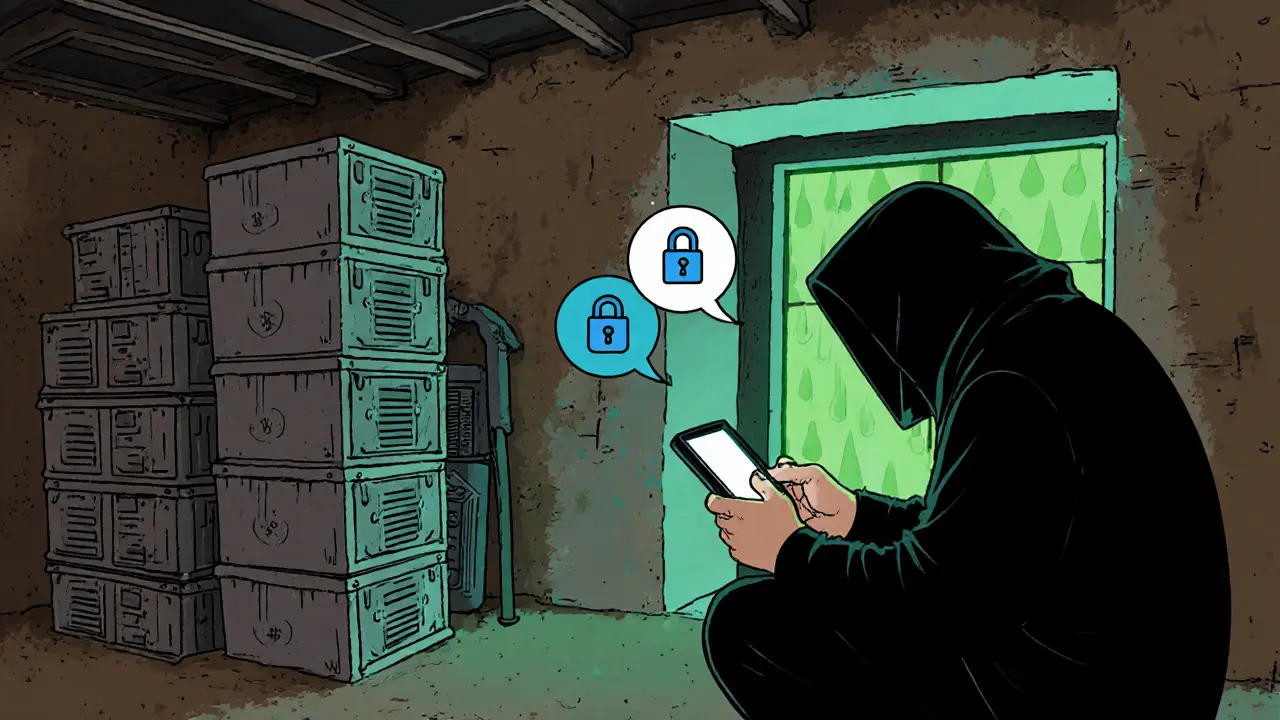In 2024 the Central Bank of Myanmar the country's monetary authority that enforces the strict crypto ban closed more than 200 bank accounts linked to digital‑currency transactions in just one week. That flash of enforcement sent a clear signal: if you touch crypto in Myanmar, your bank account could disappear overnight, and the legal fallout can be severe.
Why Myanmar Targets Cryptocurrency So Hard
Since the 2021 coup, the military junta has struggled to keep the kyat afloat. With capital controls tightening and inflation skyrocketing, the Myanmar crypto regulations were designed to stop any alternative monetary flow that could threaten the regime’s grip. The ban is not a vague advisory; it’s backed by a web of laws that criminalise every step of the crypto value chain - mining, trading, sending, receiving, even advertising.
Legal framework behind the ban
Three main statutes underpin the prohibition:
- Foreign Exchange Management Law - bans unapproved foreign‑currency exchanges, which the authorities treat crypto as.
- Financial Institutions Law - gives the CBM power to revoke banking licences or freeze accounts.
- Anti‑Money Laundering Law - treats crypto transactions as high‑risk money‑laundering activity.
Violating any of these can trigger three layers of punishment: immediate account closure, a monetary fine, and possible imprisonment.
How account closures are carried out
When the CBM spots a suspicious transaction, it sends a formal notice to the bank involved. Within 48 hours the bank must freeze the account and hand over all transaction records to the CBM’s compliance unit. The account holder receives a short email or SMS warning, often with a final deadline to prove the funds are not crypto‑related. Miss the deadline, and the account is permanently closed - no appeals, no grace period.
Penalties you might face
| Offence | Account Action | Fine (MMK) | Imprisonment |
|---|---|---|---|
| Buying or selling Bitcoin, Ethereum, Litecoin, Tether | Immediate closure | 5 million - 20 million | 6 months - 3 years |
| Operating a mining rig | Account freeze + seizure of equipment | 10 million - 30 million | 1 year - 5 years |
| Facilitating peer‑to‑peer transfers on Telegram or offshore exchanges | Closure + blacklist | 3 million - 15 million | 6 months - 2 years |
These numbers come from court filings and CBM public notices released between 2023 and 2025. The fines are often accompanied by a criminal record, which makes future banking virtually impossible.

Underground activity and its risks
Despite the crackdown, an underground market thrives. Miners hide rigs in hidden basements, using solar panels to avoid electricity spikes that could draw attention. Traders move to encrypted chat apps like Telegram, where they rely on personal referrals and escrow bots. Stablecoins, especially USDT on the Tron network, dominate cross‑border payments because they’re easy to convert into cash through informal channels. The danger? Every transaction leaves a digital breadcrumb. The CBM monitors blockchain analytics firms that feed data into its AML unit. One misstep can trigger an audit, leading to the same account‑closure cascade described earlier.
What the National Unity Government (NUG) says
The opposition NUG declared Tether legal tender in the regions it controls back in December 2021. That means a resident in a NUG‑held area could technically use USDT without breaking local law - but the CBM still has jurisdiction over the formal banking system. In practice, anyone dealing with crypto faces a split legal reality: legal under the NUG, illegal under the military government.
Central Bank Digital Currency (CBDC) - a looming twist
On June 24 2025 the CBM set up the Central Committee for the Issuance of Central Bank Digital Currency. Its mandate is to develop a digital kyat, a state‑controlled alternative to private crypto. The committee’s existence signals that the junta wants to keep the benefits of blockchain - speed, traceability - while eliminating the threat to its monetary sovereignty. If a CBDC launches, the penalties for using any other digital currency are likely to become even stricter.

Practical checklist if you’re considering crypto in Myanmar
- Assume every bank account can be closed without warning. Keep a backup cash reserve.
- Avoid using personal Facebook or WhatsApp accounts for crypto trades - the CBM explicitly monitors these platforms.
- If you must trade, use fully encrypted, self‑destructing messaging apps and never store private keys on a device linked to your identity.
- Consider offshore wallets only if you have a trustworthy legal counsel familiar with Myanmar AML law.
- Stay updated on CBM notices; they often publish new “warning” bulletins that expand the list of prohibited tokens.
- Prepare for the possibility of a digital kyat rollout - be ready to migrate to the official CBDC platform to avoid future sanctions.
Following this checklist won’t make the risk disappear, but it reduces the chance of an unexpected account freeze.
Looking ahead: will the ban stay?
International pressure and the rise of underground mining suggest the CBM’s blanket ban may evolve. Some analysts predict a hybrid model: the government permits limited crypto use for remittances while tightening surveillance on speculative trading. Until a clear policy change is announced, the safest bet remains: treat all crypto activity in Myanmar as illegal and expect account‑closure penalties.
Key takeaways
- The CBM has full authority to shut down any bank account linked to crypto.
- Penalties range from hefty fines to multi‑year prison sentences.
- Underground trading continues, but it carries a high risk of detection.
- A digital kyat is on the horizon, potentially making all non‑state digital currencies even riskier.
Can I keep a crypto wallet if my bank account is closed?
You can keep a non‑custodial wallet, but the CBM may still investigate any transaction that moves funds into or out of the wallet. If the investigation finds crypto activity, they can still pursue criminal charges and seize devices.
What is the difference between the CBM’s ban and the NUG’s declaration?
The CBM’s ban applies across the country under the military government and controls the formal banking system. The NUG’s declaration applies only in territories it controls and has no power over banks, so using crypto there remains illegal from the CBM’s perspective.
Will the upcoming digital kyat replace all other cryptocurrencies?
The digital kyat is intended to be the only legal digital currency. While it doesn’t automatically ban private crypto, the government is likely to tighten penalties for any non‑CBDC use once the system is live.
How can I verify if my bank has been flagged by the CBM?
Banks rarely announce being flagged. The first sign is usually a sudden login denial or a frozen balance. Contact the bank’s compliance department for clarification, but expect limited transparency.
Is there any safe way to receive crypto payments for my business?
The safest approach is to avoid direct crypto transactions. If you must, use a third‑party escrow service based outside Myanmar and keep records that show the funds were immediately converted to local currency through an offshore channel.







Ryan Steck
October 23, 2025 AT 08:06Wake up, sheeple! The CBM isn't just a bank regulator, it's a front for the global crypto monster that wants to lock us in a fiat cage. They're using the coup as an excuse to crush any digital freedom, and every frozen account is a warning shot. Don't trust a single sentence they publish – it's all propaganda. If you think your money is safe, think again – the state's surveillance is everywhere, even in your mom's kitchen wifi. The fines are just the cherry on top of the authoritarian cake they're serving.
James Williams, III
October 25, 2025 AT 07:19Hey folks, just breaking down the mechanics here. The CBM leverages the Foreign Exchange Management Law, the Financial Institutions Law, and AML statutes to legally shut down crypto‑related accounts. In practice, they identify suspicious transfers via blockchain analytics, issue a compliance notice, and the bank freezes the account within 48 hours. The fines range from 5 M to 30 M MMK, and imprisonment can hit up to three years. If you’re still considering crypto, hedge your exposure: keep cash reserves, use non‑custodial wallets, and stay off regulated banking channels.
Patrick Day
October 27, 2025 AT 05:32They're spying on every crypto tweet.
Jenna Em
October 29, 2025 AT 04:46Imagine a river forced to flow backwards – that's the economy under the junta, trying to push back against the natural current of decentralized finance. The ban feels like a wall, but every wall hides a doorway for those who look closely. Crypto isn't just tech; it's a philosophy of trust without borders. When the state tries to seize that trust, people find new ways to keep the flame alive, whether in hidden basements or encrypted chats. The risk is real, but the yearning for financial autonomy is stronger than fear.
Stephen Rees
October 31, 2025 AT 03:59Even in the shadows, the desire for self‑sovereignty persists. The state's heavy hand only nudges the community toward more resilient methods. While the penalty tables read like a legal thriller, many participants simply accept the danger as a cost of freedom. It's a paradox: the more the junta tightens, the more inventive the resistance becomes.
Katheline Coleman
November 2, 2025 AT 03:12Dear reader, I understand the gravity of the situation described. Allow me to summarize the essential safeguards: maintain cash liquidity, avoid linking personal social media to crypto activity, employ end‑to‑end encrypted communication for transactions, and consider legal counsel for offshore wallet usage. Your vigilance can significantly mitigate exposure to punitive measures. Please remain updated with official CBM bulletins for any regulatory changes.
Amy Kember
November 4, 2025 AT 02:26Keep backups, use burner phones, and never store keys on a device tied to your identity.
Evan Holmes
November 6, 2025 AT 01:39Another day, another crackdown – feels like they’re just bored.
Isabelle Filion
November 8, 2025 AT 00:52Ah, the spectacular melodrama of a regime hunting digital currencies as if they were dragons. One can only admire the bureaucratic fervor with which they draft statutes that would make Kafka blush. The fines, the prison terms – all a charming theatre of control, while the real economy slinks into the shadows, whispering about Tether and solar‑powered mining rigs. Bravo, dear junta, for your spectacular display of oppression.
Scott McCalman
November 10, 2025 AT 00:06📢 THIS IS WHAT HAPPENS WHEN YOU TRY TO PLAY WITH BLOCKCHAIN IN MY COUNTRY! 💥 THE BANKS ARE GONNA FREEZE YOUR ACCOUNT, FINE YOU, AND LOCK YOU UP! STOP IT NOW! 🚨
PRIYA KUMARI
November 11, 2025 AT 23:19Honestly, this whole crypto crackdown is a pathetic circus. The junta thinks they can stop the flow of value with a few forms and fines, but the reality is they’re just driving people deeper underground. Their anti‑money‑laundering rhetoric is a feeble mask for total financial domination. Stop pretending this is about security; it’s about power.
Jessica Pence
November 13, 2025 AT 22:32Hey all, just a quick note – if you're considering crypto in Myanmar, make sure you have a solid backup plan. Keep some cash on hand, don't tie your social media to any crypto activity, and use an encrypted app for any needed communications. Also, double‑check the latest CBM notices – they often update the list of banned tokens without notice. Stay safe out there!
johnny garcia
November 15, 2025 AT 21:46In the grand tapestry of sovereign finance, the CBM's actions represent a stark counter‑movement to the decentralized ethos that underpins blockchain technology. One might argue that the imposition of draconian penalties betrays an inherent insecurity within the regime, an anxiety about relinquishing monetary hegemony to a borderless ledger. Yet, the very existence of a forthcoming digital kyat illustrates a paradox: the state seeks to harness blockchain's efficiency while stifling its very freedom. 📜💡
Andrew Smith
November 17, 2025 AT 20:59Great overview! I appreciate the practical tips. Staying optimistic, I think the community can adapt by using safe, offline methods and keeping an eye on any policy shifts. Let's keep supporting each other and sharing knowledge. Together we'll navigate this tough environment.
Ryan Comers
November 19, 2025 AT 20:12Wow, look at this overblown drama! As an American, I can't believe a small Asian country can scare us with their petty account freezes. If they think they can stop crypto, they're living in a fantasy. Let's be real – crypto's unstoppable, and no junta can change that!
Prerna Sahrawat
November 21, 2025 AT 19:26When one reflects upon the intricate lattice of power structures that define contemporary monetary policy, it becomes evident that Myanmar's current stance is not merely a reactionary measure but a profound statement of ideological sovereignty. The military junta, intent on preserving its hegemony, perceives decentralized financial instruments as existential threats to the carefully curated narrative of control. Consequently, the enactment of punitive statutes serves both as a deterrent and as a symbolic assertion of dominance over the populace' economic agency. Yet, history has shown that suppression invariably fuels innovation; the very act of outlawing crypto fuels a subterranean network of determined technophiles. These actors, armed with solar‑powered mining rigs hidden in basements, embody a resilient counter‑culture that refuses to acquiesce. Their reliance on encrypted messaging platforms like Telegram illustrates an adaptive response to surveillance, while the proliferation of stablecoins such as USDT on the Tron network underscores a pragmatic approach to cross‑border value transfer. Moreover, the nascent digital kyat project, while ostensibly a state‑controlled alternative, paradoxically validates the utility of blockchain frameworks, albeit under state oversight. This duality illustrates a broader paradox: the junta seeks to harness blockchain's inherent efficiencies while simultaneously extinguishing its decentralized ethos. The futures of such policies remain uncertain; however, the relentless pursuit of financial autonomy suggests that any monolithic attempt at suppression will ultimately be fragmented by the ingenuity of those it aims to control. In sum, this complex interplay of authoritarian intent, technological adaptation, and societal resilience forms a compelling tapestry that will shape Myanmar's economic landscape for years to come.
Joy Garcia
November 23, 2025 AT 18:39Interesting points, but the risk is too high for many.
mike ballard
November 25, 2025 AT 17:52From a cultural perspective, the crackdown reflects a clash between traditional authority and modern digital expression. It's fascinating how tech adapts across societies.
Molly van der Schee
November 27, 2025 AT 17:06I hear you all. It's tough, but staying informed and supporting each other can make a difference. Let's keep sharing safe practices.
Mike Cristobal
November 29, 2025 AT 16:19People who ignore these warnings are morally reckless. The junta's measures protect societal order, and anyone bypassing them is complicit in chaos.
Erik Shear
December 1, 2025 AT 15:32Enough of the division. Let's find a middle ground where security and innovation coexist. The current approach only fuels resentment.
Tom Glynn
December 3, 2025 AT 14:46Very insightful! I think we can all agree that education and responsible usage are key. Keep the dialogue alive!
Johanna Hegewald
December 5, 2025 AT 13:59Quick tip: keep a physical copy of your wallet seed offline – it's the safest way to protect your crypto if the bank freezes your accounts.
Benjamin Debrick
December 7, 2025 AT 13:12In contemplating the jurisprudential ramifications of the Central Bank of Myanmar's recent operational directives, one must acknowledge the intricate confluence of sovereign monetary prerogatives and emergent decentralized financial architectures. The legislative triad-the Foreign Exchange Management Law, the Financial Institutions Law, and the Anti‑Money‑Laundering statute-operates not merely as a punitive assemblage but as an articulate articulation of statecraft intent on circumscribing the epistemic frontier of value exchange. Consequently, the codified penalties, ranging from multimillion‑kyat pecuniary sanctions to multi‑year incarcerations, epitomize a systemic desire to reassert hegemony over fiscal conduits that erstwhile eluded traditional oversight. Yet, in the dialectic of governance versus innovation, the nascent digital kyat project emerges as a paradoxical embodiment of this very tension: a state‑sanctioned blockchain paradigm intended to subsume the libertarian promise of cryptocurrencies whilst preserving the sovereign's ontological grip on monetary sovereignty. Such a juxtaposition necessitates a rigorous, interdisciplinary discourse-spanning legal theory, cryptographic methodology, and socio‑economic praxis-to elucidate the trajectory of Myanmar's financial sovereignty in an era where digital and fiduciary realms inexorably converge.